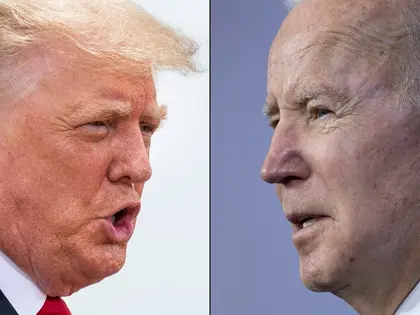While the stakes could hardly be higher for American democracy, voters are increasingly turned off by the apparently inevitable rematch between Joe Biden and Donald Trump.
"It's hard to be excited about it," said Keely Catron, 22, from Arizona, a swing state that Biden narrowly won in 2020. "It's frustrating that our only two options seem like very old white men."
JOIN US ON TELEGRAM
Follow our coverage of the war on the @Kyivpost_official.
The education sciences student said she would still vote for the 80-year-old Democrat again in the election on November 5, 2024, albeit without much enthusiasm.
As he eyes a second term, Biden has no serious rivals for the Democratic nomination, despite suffering from perpetually low approval ratings and growing concerns about his age.
Trump, meanwhile, is the clear Republican frontrunner despite the 77-year-old former president facing multiple criminal trials including one over alleged election interference.
And their race for the White House is already on a knife edge. Polls show them neck and neck, with Trump even edging ahead in some of the latest surveys.
What's at stake is huge.
A commentary in the New York Times said it would be "the most important election since 1860" -- when Abraham Lincoln was elected president, triggering the US Civil War.
- 'Exhausted' by politics -
The United States is still deeply polarized after hard-right populist Trump tried to overturn the result when Biden beat him in 2020, and there are fears of deeper civil strife this time around.

Trump Reportedly Mulls Ric Grenell for Peace Envoy Post
America's allies are watching nervously too. Washington's key global role has been underscored by the Israel-Hamas and Ukraine conflicts, while China, Russia and Iran are forging their versions of a new world order that is no longer dominated by the United States.
But voters don't seem to care.
Sixty-three percent of Americans said they were dissatisfied with the candidates who have emerged so far, a recent Pew Research study said, and 65 percent said they "always or often feel exhausted" when thinking about politics.
More than three in five Democrats and Democratic-leaning independents said they would prefer a nominee other than Biden, an ABC-Washington Post survey found.
Half of Biden supporters and nearly three in ten Trump supporters said they were open to other options, a Quinnipiac survey in September showed.
Poll after poll shows negative approval ratings for both candidates.
The two candidates -- the oldest two nominees in US history, as they were too in 2020 -- have tried to rally their supporters in different ways.
Biden has repeatedly spoken of a "battle for the soul of the nation" and warned that Trump's "extremism" threatens American democracy.
His campaign is hoping that message, and an emphasis on his role as global statesman recently on Israel and Ukraine, plays better with voters than his attempts to sell his "Bidenomics" economic policy.
- 'Hatred' -
For his part, Trump's rhetoric has turned even darker than in the days when he protested the 2020 result and thousands of his supporters attacked the Capitol on January 6, 2021.
He has said there's a "level of hatred that I've never seen" and played again and again on themes of immigration and nationalism.
But David Karol, who teaches government and politics at the University of Maryland, played down the fact that neither candidate seemed that popular.
"This thing about people not wanting the rematch -- if voters really wanted other candidates, they could get them," he told AFP.
Democrats had never seriously put forward other alternatives to Biden.
Republicans have had plenty of chance to see other options including Florida governor Ron DeSantis and former UN ambassador Nikki Haley in recent TV debates that Trump shunned -- but the party still wants Trump, he said.
Karol said that while most US voters seemed highly entrenched in an election likely to hinge on a few states, even a small swing on a key issue -- such as possible Trump convictions -- could make a "huge difference."
You can also highlight the text and press Ctrl + Enter






